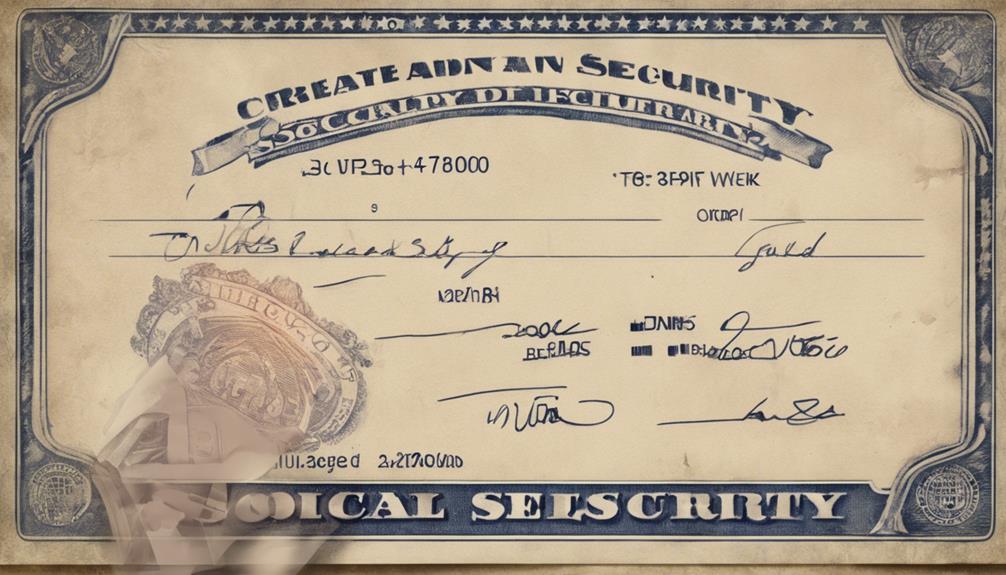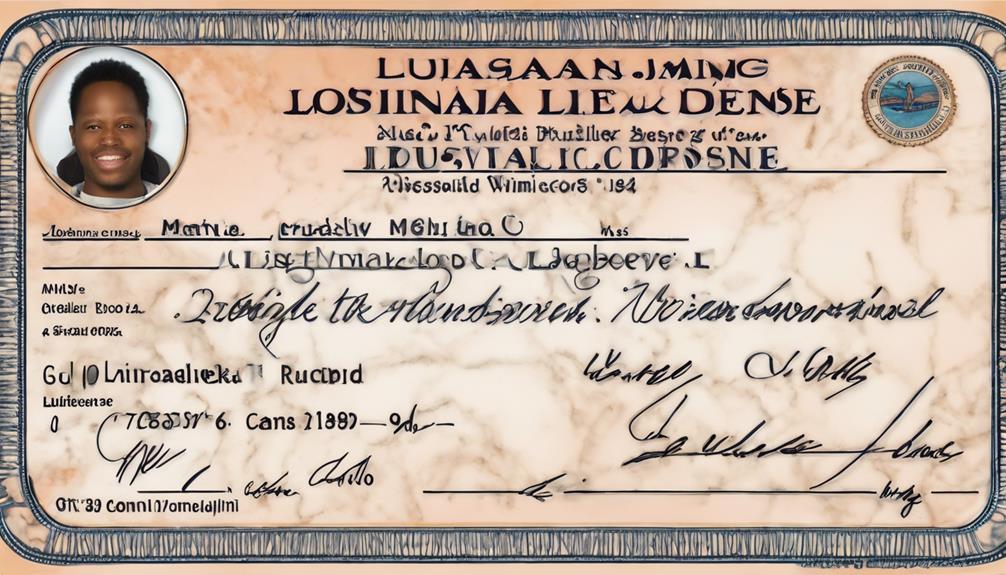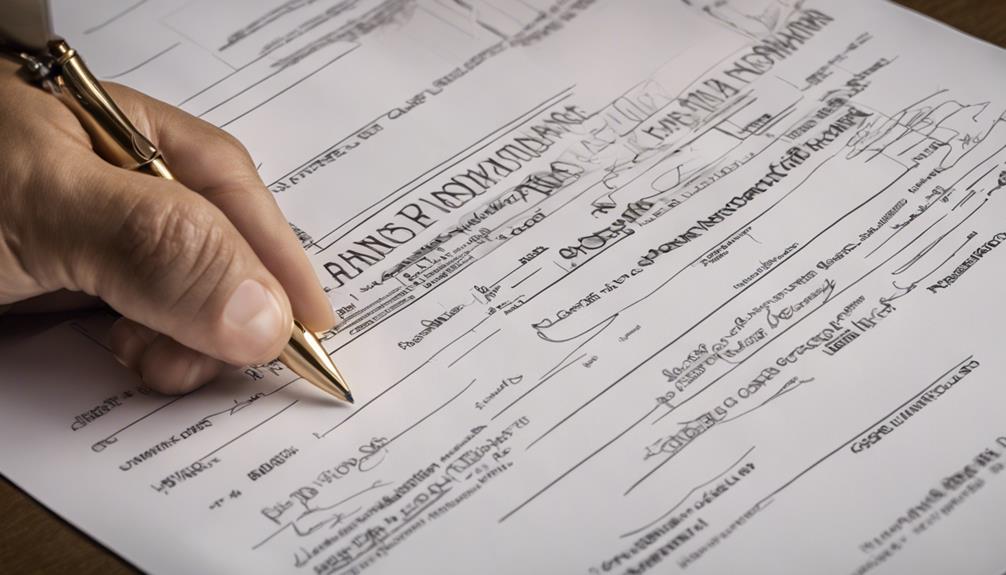In Louisiana, the process of changing one’s name requires filling out a petition in the parish court, meeting legal criteria, and announcing the change in a newspaper. To change a name after marriage, it is necessary to list the pre-wedding names on the marriage license, obtain a marriage certificate, and adhere to specific guidelines. Updating a Social Security card involves reaching out to the administration, completing Form SS-5, and providing the necessary paperwork. Changing a passport name includes filling out forms, submitting documentation, and monitoring processing times. To update a Louisiana driver’s license, a visit to the Office of Motor Vehicles is necessary, along with gathering the required documents and paying a fee. Fees are applicable and minors have specific requirements. Educating oneself further can help navigate this process smoothly.
Key Takeaways
- Initiate the process by filing a petition in the parish court.
- Follow specific marriage name change requirements.
- Understand the Social Security card name change process.
- Learn the passport name change procedure.
- Update Louisiana driver's license with the correct name.
Name Change Process Overview
The name change process in Louisiana begins by filing a petition in the parish court. Once all legal requirements are met, a court order is granted. To notify the public, the name change must be published in a local newspaper. Subsequently, a court hearing is scheduled to review the request. Additional documentation may be necessary during this stage.
Following the court order, official documents such as driver's licenses and passports need updating to reflect the new name. It's important to adhere to all procedures meticulously to guarantee a successful name change. The entire process is overseen by the parish court, with each step playing an essential role in the completion of the name change.
Individuals seeking a name change in Louisiana must follow these outlined steps diligently and accurately to achieve the desired outcome.
Marriage Name Change Requirements

To change a name after marriage in Louisiana, one must include both prewedding names on the marriage license application. This certificate is essential for updating legal documents and completing the surname change process effectively.
It's important to follow the specific requirements outlined and make sure both prewedding names are accurately listed on the marriage license.
Marriage License Application
Applying for a marriage license in Louisiana requires listing both prewedding names on the license. To guarantee a smooth surname change process, follow these steps:
- Collect necessary documents like state IDs, birth certificates, and Social Security numbers for the application.
- Visit the Parish office in Louisiana to kickstart the marriage license application process.
- Be ready to pay around $30 for the marriage license application fee.
- Keep in mind that the marriage certificate obtained through this process will be crucial for changing your surname after marriage.
Updating Legal Documents
When updating legal documents for a marriage name alteration in Louisiana, make sure all necessary paperwork is accurately submitted. The marriage license must list both prewedding names, and the marriage certificate is vital for a surname modification post-marriage.
Costs for a marriage license application vary by parish, typically around $30. To initiate a marriage name adjustment, essential documents such as state IDs, birth certificates, and Social Security numbers need to be provided.
Utilizing the marriage certificate for a surname modification is a key step in the marriage name alteration process in Louisiana. Confirm all required documents are in order to facilitate a smooth adjustment to the new name.
Social Security Card Name Change Process

When requesting a name change on your Social Security card, make sure that you contact the Social Security Administration for assistance. Follow these steps for a smooth process:
- Contact the Social Security Administration: Reach out to the SSA to begin the name change process.
- Fill Out Form SS-5: Complete Form SS-5 accurately with all required information and provide supporting documents.
- Submit Legal Name Change Documents: Make certain to include original or certified copies of legal documents that support your name change.
- Free Post-Marriage or Divorce Updates: Updating your Social Security card after marriage or divorce is free of charge, but follow specific requirements and instructions to prevent delays.
Passport Name Change Procedure

When changing your name on your passport in Louisiana, start by completing Form DS-5504 or DS-82 based on your eligibility.
Submit the form, along with required documents and fees, which typically include the standard passport renewal fee.
Specific requirements and processing times for passport name changes may vary, so it's crucial to check with the passport office for accurate information.
Required Documents for Passport
For a passport name change procedure, the necessary documents include Form DS-5504 or DS-82 along with supporting documents like marriage certificates or court orders. When applying for a passport name change, it's important to gather the required paperwork to facilitate a smooth process.
Here are the essential documents you'll need:
- Form DS-5504 or DS-82: The official forms required for a passport name change.
- Supporting Documents: Such as marriage certificates or court orders to substantiate the name change request.
- Fees: The cost for passport name changes may vary, with standard renewal fees typically applying.
- Original or Certified Copies: Make sure you provide these for all supporting documents to validate your name change request.
Submission Process and Timeline
The submission process for a passport name change involves completing Form DS-5504 or DS-82 and submitting the necessary documents along with the required fees. The fees for a passport name change vary, with the standard passport renewal fee typically applying.
It's crucial to check the specific requirements and processing times for passport name changes to guarantee a smooth shift. When changing your name on your passport, updating your Social Security card is free of charge. Make sure to follow all guidelines and submit accurate information to avoid delays in the process.
With the correct documentation and fees in place, the passport name change procedure can be efficiently completed within the allotted timeline.
Louisiana Drivers License Name Change Steps

Visiting the Office of Motor Vehicles in Louisiana is the initial step for obtaining a duplicate license with the updated name. To streamline the process and guarantee a successful name change on your driver's license, follow these steps:
- Gather Required Documents:
- Bring proof of your name change, such as a marriage certificate or court order.
- Have your current driver's license, proof of residency, and insurance documentation on hand.
- Prepare for Fees:
- Be ready to pay between $13 to $17 for the duplicate license.
- Additional local fees may apply specifically for a name change.
- Update All State Credentials:
- To maintain consistency, update all state-issued identification documents simultaneously.
- Include ID Card Updates:
- Alongside your driver's license, remember to update other forms of identification like ID cards for thorough name change completion.
Name Change Petition Filing

After acquiring a duplicate driver's license with the updated name, individuals in Louisiana may proceed with the process of submitting a name change petition. This involves accurately and completely filling out the necessary forms.
For those needing assistance with form printing, local libraries in Louisiana can provide help. It's important to submit the petition at specific locations that accept name change filings within the state.
Costs for filing a name change petition can vary depending on the parish. However, procedures are in place to assist individuals who may not be able to afford the associated fees. By following these steps diligently, individuals can navigate the name change petition filing process efficiently and effectively.
Name Change Court Hearing

Upon entering the courtroom for the name change court hearing in Louisiana, individuals should be prepared to present their case before the judge. During this pivotal step, the judge reviews the petition along with any supporting documentation provided.
The court hearing offers an opportunity for any objections to the name change request to be raised and considered by the judge. It's essential to be ready to provide any additional testimony or evidence that may be required during the hearing to support the name change request.
Ultimately, the judge will make a decision on whether to grant or deny the name change request based on the presented information. If the name change request is approved, a court order will be issued following the court hearing.
Name Change Fees and Costs

Name change fees and costs in Louisiana typically range from $300 to $500 and can vary depending on the parish. These costs usually cover filing fees, publication fees for the name change notice, and court fees.
It's crucial to factor in additional expenses that may arise, such as obtaining certified copies of documents or seeking legal assistance. Some parishes offer fee waivers or reductions based on financial need, so it's worth exploring these options.
To guarantee a smooth name change process, individuals should budget carefully for all potential costs associated with the legal procedures in Louisiana. Being prepared and informed about the fees involved will help individuals navigate the name change process efficiently and avoid any unexpected financial burdens.
Minors Name Change Process

To proceed with a minor's name change in Louisiana, both parents' signatures on the petition are mandatory. Exceptions to this rule may apply in specific circumstances.
Required fees for the minor's name change process vary by parish.
During the court hearing for the name change, minors must provide identification.
The judge will then decide whether to grant or deny the minor's name change request and update parish records accordingly.
Frequently Asked Questions
What Do I Need to Do to Change My Name in Louisiana?
To alter a name in Louisiana, one must submit a petition in the parish court, confirm precise details, and pay the filing fee. Upon meeting requirements, a court order is granted. Publication in a local newspaper and a court hearing may be necessary.
How Much Does It Cost to Change Your Name Legally in Louisiana?
Changing one's name in Louisiana can be a financial commitment, with costs typically ranging from $300 to $500. This includes court filing fees, publication expenses, and potentially hiring legal assistance, all essential for a successful name change.
How Do I Change My Name at the DMV in Louisiana?
To change a name at the Louisiana DMV, one must present proof of the change, like a marriage certificate or court order. Bring the current driver's license, required documents, and pay the fee, typically $13-$17.
How Do I Change My Name After Marriage in New Orleans?
Changing a name after marriage in New Orleans involves obtaining a certified marriage license, updating Social Security details, changing the driver's license, and informing various entities. HitchSwitch can help simplify the process for those seeking assistance.
Is The Ultimate Guide to Name Change in Louisiana a Comprehensive Resource?
Yes, the Ultimate Guide to Name Change in Louisiana is indeed a comprehensive resource. It covers all the necessary steps and requirements for a comprehensive Louisiana name change, making the process easier and more straightforward for anyone looking to change their name in the state.
Conclusion
To sum up, altering your name in Louisiana can be a simple process if you follow the required steps.
Remember, 'patience is a virtue' when maneuvering the different requirements for a name change, such as updating your social security card, passport, and driver's license.
By following the outlined procedures for minors or adults, you can successfully change your name in the state of Louisiana with ease.











